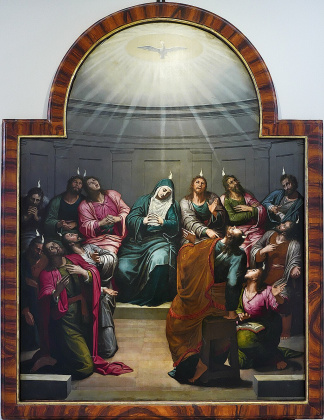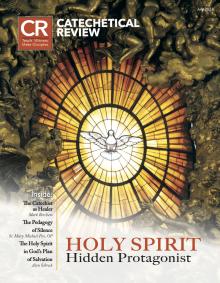 Pentecost, the sending of the Holy Spirit, ushered in the final stage of God’s plan of salvation. The great gift that Jesus foretold, the “promise of the Father,” had now been sent, and the Church emerged with a power that would transform individual lives and change human history.[1] Even though the Holy Spirit remains the “hidden protagonist” behind this—portrayed in Scripture mainly in images from nature—his action is indispensable.
Pentecost, the sending of the Holy Spirit, ushered in the final stage of God’s plan of salvation. The great gift that Jesus foretold, the “promise of the Father,” had now been sent, and the Church emerged with a power that would transform individual lives and change human history.[1] Even though the Holy Spirit remains the “hidden protagonist” behind this—portrayed in Scripture mainly in images from nature—his action is indispensable.
The climax of the revelation of the Spirit as a person of God is in the Gospel of John, where Jesus refers to the Spirit as another Advocate, Counselor, or Consoler,[2] who will be with (literally, “called to the side of”) every Christian. The Holy Spirit is not an impersonal “force.” St. Cyril of Jerusalem explained that “the Spirit comes with the tenderness of a true friend and protector to save, to heal, to counsel, to console.”[3] The Catechism, similarly, calls the Holy Spirit “the interior Master of life according to Christ, a gentle guest and friend who inspires, guides, corrects, and strengthens this life” (1697). The Holy Spirit comes to the Christian and to the Church, continuing Jesus’s presence and mission in them.
The Holy Spirit in the Life of the Christian
So, what does the Holy Spirit do as the “hidden protagonist” carrying out God’s work? Let’s consider first the Holy Spirit’s work in the individual. At baptism, the Holy Spirit cleanses all sin, enabling the baptized person to become an adopted child of God, a “new creation” (2 Cor 5:17) and a temple in which God’s Spirit dwells (1 Cor 3:16). In other words, the baptized receives “sanctifying grace,” which “is the indwelling of the Holy Spirit, himself in person, and with the Holy Spirit, the whole Trinity.”[4]
The Holy Spirit entering the soul is only the beginning. In fact, there is no aspect or dimension of the life of the baptized in which the Holy Spirit is not present and active insofar as the person responds positively, in faith, to the Spirit’s action. One can call upon the Holy Spirit to strengthen any weakness or provide for any deficiency in every aspect of Christian life.
- Prayer. All Christian prayer, in whatever form, is prayer in the Holy Spirit, “the interior Master of Christian prayer”(CCC 2672), who “teaches the children of God how to pray” (CCC 2650). The Holy Spirit prays within us (Rom 8:26), so we worship God, as Jesus taught, “in Spirit and truth” (Jn 4:23, 24). “The Holy Spirit is the living water ‘welling up to eternal life’ in the heart that prays” (CCC 2652).
- Knowledge of God and Revealed Truths. The Holy Spirit is “the Spirit of truth” (Jn 14:17; 16:13), who alone enables us to recognize the Lordship of Jesus (1 Cor 12:3) and God the Father as “Abba,” our “dear Father” (Rom 8:15–17; Gal 4:6). The Spirit also enables faithful Christians, guided by the Church’s teaching office (Magisterium), to recognize and embrace true teaching: “He will guide you to all truth” (Jn 16:13).
- Holiness and Sanctification. The Holy Spirit is the “Sanctifier,” who makes us holy as we cooperate with his grace. As St. Paul taught, the Holy Spirit enables each Christian to reject sin (the “works of the flesh” [Gal 5:19]) and to bear the “fruit” of holiness, the “fruit” that comes from living according to the Holy Spirit (Gal 5:22–23). Pope St. John Paul II taught in his encyclical letter on the Holy Spirit, Dominum et Vivificantem, that in the moral life the Holy Spirit is a “double gift.” First, he shows us or convicts us of our sin (Jn 16:8). Then, he empowers those who call upon him to overcome sin in our lives.[5] Willpower is not enough; only the Holy Spirit, with our prayer and cooperation, can liberate us from sin, leading us to freedom and holiness.
- Witness and Evangelization. As Pope St. Paul VI observed in Evangelii Nuntiandi, techniques of evangelization are good, but without the Holy Spirit, “the principal agent of evangelization,” they are fruitless.[6] Jesus gave his followers a “great commission” (Mt 28:19) to proclaim the Good News to all people, but it is the Holy Spirit who empowers our witness (Acts 1:8) and who gives us the right words to say (Lk 12:11–12). Pope Francis urges us to be “Spirit-filled Evangelizers.”[7] Yet, only the Holy Spirit can touch those who hear with the grace to believe, as on the day of Pentecost (Acts 2:37–41).
- Guidance. The Holy Spirit provides wisdom and discernment for the day-to-day and long-term decisions everyone needs to make. The Spirit also provides the courage to carry these out. Isaiah prophesies the gifts that the Spirit of the Lord gives to the Messiah and confers on each of God’s “messianic people,” especially through the sacrament of Confirmation: wisdom, understanding, counsel, knowledge, fortitude, piety, and fear of the Lord (11:2). To enter God’s kingdom, and to spread that kingdom here on earth, each Christian must be guided by the Holy Spirit using these gifts he provides. We see many examples of this in the Acts of the Apostles.[8] The Holy Spirit must always be our spiritual director and our guide.
- Hope and the Pledge of Eternal Life. In this age of uncertainty and fear, the Holy Spirit is the best basis of hope, a hope that “does not disappoint us” (Rom 5:5). Jesus promised that the Holy Spirit would remain with us, and St. Paul often speaks of the experience of the Spirit as a “pledge,” “downpayment,” “guarantee,” or “firstfruits” of eternal life.[9]
- Love. Perhaps the most important work of the Holy Spirit is that he is the “love of God . . . poured out into our hearts” (Rom 5:5). St. Thomas Aquinas, following St. Augustine, calls “Love” a proper name of the Holy Spirit.[10] St. John Paul II refers to the Spirit as “Person-Love” and “Person-Gift.”[11] Why is this so important? Because the “Great Commandment” necessary to enter God’s kingdom—love of God and love of neighbor—can only be fulfilled by the grace of the Holy Spirit. Natural human love can only bring us so far. Only by the outpouring of the Holy Spirit, won for us by Jesus’s sacrificial death, can anyone fulfill his “new commandment” to “love one another. As I have loved you, so you also should love one another”(Jn 13:34).
The Holy Spirit in the Church
The Holy Spirit is also essential in every dimension of the Church’s life. Some of these are parallel with the Holy Spirit’s work in the individual. First, because the Holy Spirit enables each Christian to pray, he is the source and teacher of the Church’s prayer, either when “two or three or gathered together in [Christ’s] name” (Mt 18:20) or in the formal, liturgical prayer of the Mass and the sacraments. A section from the second part of the Catechism, on “The Celebration of Christian Mystery,” introduces this theme:
In the liturgy the Holy Spirit is teacher of the faith of the People of God and artisan of “God’s masterpieces,” the sacraments of the New Covenant. . . . When the Spirit encounters in us the response of faith he has aroused in us, he brings about genuine cooperation. Through it, the liturgy becomes the common work of the Holy Spirit and the Church. (1091)
The Holy Spirit is the artisan of the sacraments in two ways. First, the rites of each of the seven sacraments include an invocation of the Holy Spirit (an epiclesis), which empowers the sacrament, along with its institution by Jesus Christ through his word or example. Second, there is a sacramental grace—a special grace unique to each sacrament—that is conferred by the sacrament through the action of the Holy Spirit (CCC 2003).
As the Holy Spirit guides individual Christians to recognize truth in matters of faith, in an even more authoritative way he guides the Church to interpret Scripture, define doctrine, and make pastoral decisions through the successors of the apostles, the bishops, who together comprise the Church’s Magisterium. We see this in the first gathering of all the elders of the early Church to adjudicate a matter of major pastoral importance. The Acts of the Apostles reports that, after prayer and deliberation, they issued a letter announcing their decision with the words, “It is the decision of the holy Spirit and of us” (Acts 15:28). St. Peter, on two occasions, received direct revelation about the truth: when he declared that Jesus was the Christ, the Messiah (Mt 16:16), and when the Holy Spirit fell upon Cornelius and his household, and Peter declared that they could be baptized even though they, as Gentiles, were not circumcised (Acts 10, esp. 44–48). From these examples, the Church came to recognize that the bishops, especially when gathered in an ecumenical council, and Peter’s successor, the pope, would be empowered to guide the Church in matters of faith by the Holy Spirit.
Further, while sacraments are conferred by the Church for the good of individuals who receive them, the Holy Spirit freely confers spiritual gifts, called charisms, on individuals for the benefit and upbuilding of the Church. It should not be surprising that if Jesus did mighty works (healing, prophecy, deliverance from evil spirits), that his followers would do the same, and even “greater ones than these” (Jn 14:12). The charisms listed by Sts. Peter and Paul in Scripture include not only those that appear ordinary (like service, teaching, and hospitality) but also more extraordinary ones of a more “spiritual” nature.[12] Since the Church is both a human and divine institution, we should not be surprised that the Holy Spirit equips the Church with spiritual gifts to carry out its divine mission, just as Jesus did. St. Paul taught that these charisms are to be “tested” or discerned by the Christian community and Church leaders, but not “despised” or “quenched” (1 Thes 5:19–22). As the Second Vatican Council taught, “they are to be received with thanksgiving and consolation since they are fitting and useful for the needs of the Church.”[13]
Finally, the Holy Spirit works in the Church in the four marks of the Church: one, holy, catholic, and apostolic. The Church is “one.” Jesus founded only one people, one Church, and the Holy Spirit is the divine source of the Church's unity (cf. Eph 4:3,4). The Church is “holy” because the Holy Spirit dwells in her (Eph 2:22), as he dwells in the souls of the baptized. Yes, the Church is made up of sinners, but sin is not the true nature of the Church: holiness is because God’s gift, the Holy Spirit, is the soul of the Church, as St. Augustine taught.[14]
The Church is “catholic,” or universal, because she embraces all people, as we see on the day of Pentecost when people from all corners of the Roman Empire heard the proclamation of the Gospel in their own language through the power of the Holy Spirit (Acts 2:5–11).
The Church is “apostolic”—“built upon the foundation of the apostles” (Eph 2:20). In John’s Gospel, on Easter morning, Jesus breathed the Holy Spirit on the apostles, giving them authority to forgive sins (Jn 20:19–23). At Pentecost, the apostles began to carry out their commission from Jesus to preach the Good News and proceeded to establish churches through the power of the Holy Spirit.
The Spirit of Unity
Today, I believe we need to recover the meaning and the reality of the first mark of the Church: unity. Satan’s main strategy to destroy the Church is “divide and conquer.” The Holy Spirit’s work is to promote unity based on truth and love.
The unity of the Church is a reflection of the unity of the Blessed Trinity. The Holy Spirit is the bond of unity, as Love, between God the Father and the Son. Likewise, the Holy Spirit is the source and bond of unity in the Church. The New Testament testifies to this in Acts 4:32; Philippians 2:1–2; and perhaps most clearly in Ephesians 4:1–4. This is the powerful statement of the Holy Spirit as the source of unity in the Body of Christ and also of the diversity of charisms that help build that unity (Eph 4:7, 11–13). Many of the early post-apostolic Christian writings—like those of Pope St. Clement I and St. Ignatius of Antioch—focus on the need for unity in the congregations they addressed.
I have contended that the surest sign of the presence of the Holy Spirit in the Church, and in any group, is the unity that they exhibit: the presence of genuine self-giving love among them, reaching out to others.[15] The Letters to the Ephesians and to the Colossians speak of “forbearing one another” in love, which necessitates forgiveness whenever a wrong is done.[16] This agape love cannot be counterfeited. It is the fulfillment of the “great commandment” of love that Jesus proclaimed. Yes, unity must be based on truth, and the Holy Spirit is the Spirit of Truth. But truth without love is sterile. Jesus concluded his teaching on his “new commandment” of love: “This is how all will know that you are my disciples, if you have love for one another” (Jn 13:35). The Holy Spirit is the source and author of this love, which, combined with truth, is the basis of the Church’s unity.
The Catechism of the Catholic Church provides a fine summary of the work of the Holy Spirit in the Church:
The Holy Spirit is “the principle of every vital and truly saving action in each part of the Body.” He works in many ways to build up the whole Body in charity: by God’s Word “which is able to build you up”; by Baptism, through which he forms Christ’s Body; by the sacraments, which give growth and healing to Christ’s members; by “the grace of the apostles, which holds first place among his gifts”; by the virtues, which make us act according to what is good; finally, by the many special graces (called “charisms”), by which he makes the faithful “fit and ready to undertake various tasks and offices for the renewal and building up of the Church.” (798)[17]
Let us thank the Lord for the gift of the Holy Spirit and continue to pray for fresh outpourings of the Spirit in our day, to prepare our hearts and the world for the Lord’s coming. “Amen! Come, Lord Jesus!” (Rev 22:20)
Alan Schreck, PhD is Professor Emeritus of Theology at Franciscan University of Steubenville. He is the author of numerous books, including The Essential Catholic Catechism (TAN/St. Benedict's Press), Your Life in the Holy Spirit (Word Among Us Press), and The Gift: Discovering the Holy Spirit in Catholic Tradition (Paraclete Press).
Notes
[1] Holy Spirit as gift: Jn 4:10; Acts 2:38; 10:45. Holy Spirit as promise of the Father: Lk 24:49; Acts 2:33; Gal 3:14; Eph 1:13. Power and the Holy Spirit: Acts 1:8.
[2] From the Greek parakletos. See Jn 14:16, 26.
[3] Cyril of Jerusalem, Catechetical Lecture 16 “On the Holy Spirit,” in Liturgy of the Hours, vol. 2 (New York: Catholic Book Publishing, 1975), 967–68.
[4] Raniero Cantalamessa, Come, Creator Spirit (Collegeville, MN: Liturgical Press, 2003), 82. See also St. Thomas Aquinas, Summa Theologiae (ST) I, q. 43, a. 3, resp.
[5] St. John Paul II, Dominum et Vivificantem, nos. 31–32.
[6] Paul VI, Evangelii Nuntiandi, no. 75.
[7] “Spirit-filled evangelizers means evangelizers fearlessly open to the working of the Holy Spirit.” Pope Francis, Evangelii Gaudium, no. 259.
[8] See: Acts 8:39; 10:19; 13:2; 16:6–8; 20:23; 21:4.
[9] See: 2 Cor 1:20–22; 5:1–5; Eph 1:13, 14; Rom 8:23; 15:13.
[10] Aquinas, ST I, q. 37.
[11] John Paul II, Dominum et Vivificantem, no. 10.
[12] See: 1 Cor 12:7–11, 27–31; Rom 12:6–8; Eph 4:11–16; 1 Pt 4:10, 11.
[13] Second Vatican Council, Lumen Gentium, no. 12. Sadly, while most Confirmation catechesis emphasizes the Old Testament gifts of the Holy Spirit (Is 11:1–2), seldom are Confirmation candidates presented with the New Testament gifts of the Holy Spirit listed by Sts. Peter and Paul. Consequently, they are rarely instructed to pray for these gifts and to expect them in receiving the Sacrament of Confirmation. The content of these gifts, or “charisms,” are clearly presented both in Scripture and in the Catechism of the Catholic Church, 798–801 and 2003.
[14] See CCC 797, quoting St. Augustine, Sermo 267, 4 (PL 38, 1231D).
[15] See Alan Schreck, “Unity: The Spirit’s Greatest Gift,” in Your Life in the Holy Spirit (Ijamsville, MD: Word Among Us Press, 1995).
[16] See Eph 4:2; Col 3:13.
[17] See: Pius XII, Mystici Corporis, no. 57; Eph 4:16; Acts 20:32; 1 Cor 12:13; Second Vatican Council, Lumen Gentium 7, 12; Apostolicam Actuositatem, no. 3.
This article originally appeared on pages 7-10 of the print edition.
Art credit: Pentecostés by Pedro de Campaña at Wiki Media Commons.
This article is from The Catechetical Review (Online Edition ISSN 2379-6324) and may be copied for catechetical purposes only. It may not be reprinted in another published work without the permission of The Catechetical Review by contacting [email protected]


















